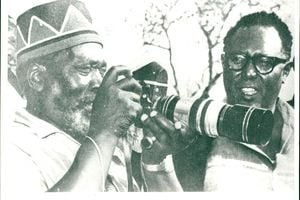How Karume built a multi-million shilling empire that included beer distribution

Mr Njenga Karume with Mr Fred Mbiyu Koinange at his cigarette shop in Kiambu in 1965. In later years, Mr Karume was to venture into the beer distribution business. Photo/EAEP
What you need to know:
- His business empire was growing but he still had an eye for more opportunities, one of which came when South African Breweries entered the Kenyan market as he tells us in the fourth part of the serialisation of his biography
The next momentous event in my business life was the entry of South African Breweries (SAB) into the Kenyan market.
One day, while I was staying at my Indian Ocean Beach Resort in Mombasa, the receptionist phoned me in my cottage and told me there was a visitor who wanted to see me. The visitor’s name did not ring a bell.
When I went round to receive the visitor, I found that it was a white man I had known some twenty-five years before, a Mr Glen. The man told me that he was now a business consultant, and he was in Kenya on behalf of SAB.
South African Breweries, the biggest in Africa and fourth largest in the world, was interested in increasing its profile in the East African region by building a factory in Kenya and setting up an administration and marketing centre. Previously, the organisation’s products were being sold in Kenya on franchise basis by Kenya Breweries Limited (KBL).
SAB knew that the East African market had enormous potential and that it could increase its profits by setting up a factory in the region. Such a factory would minimise transport costs and the company could carry out a more vigorous marketing strategy.
SAB, therefore, was looking for strategic local investors who knew the local brewing industry well. The consultant wished to engage me as an investor since he was aware that I had been in the beer distribution industry for over thirty-seven years and that I was also financially capable of investing significant amounts in setting up such a factory.
It seems that the opinion was that with my business experience in beer, few were better suited to be SAB’s strategic investor in Kenya.
He explained the facts and figures of the project to me and I in turn informed him that I would examine the various facets of the proposal and communicate my decision after seeking advice from my financial managers.
After investigating the feasibility of the project and receiving advice from experts, I decided it would be prudent and advantageous to make the investment. It would be a challenge, but then I had never feared trying something new.
I determined that, since I was going to be made a director of the company, I could put money into the factory and simultaneously increase my fleet of transport lorries so that I could act as a distributor for the company as well.
In this respect, I did not intend to stop distributing beer for my old company KBL and I was confident that I would handle both tasks with ease. At the time, I never realised that others might see a conflict of interests in this new move.
After all, I reasoned, whereas I was an investor with the new company, I was just one of the transporters (although one of the biggest) of KBL. Unfortunately this opinion of mine was to cause me a great deal of stress in later life.
New factory
And so Castle Brewing Kenya Limited was started. I invested hundreds of millions in the project and was made a director of the company. The factory was built in Thika and it employed hundreds of people. The people of Thika town were happy since they knew the new factory would make a great deal of difference to the town’s economy.
Other than the obvious benefit of creating jobs, businesses and other sectors such as housing would profit significantly. There was excitement at the prospect of Castle penetrating the Kenyan market which heretofore had been virtually monopolized by KBL since it was founded in 1922.
This started my problems with KBL. Castle Brewing entered the market with style, selling beers that rivalled each of KBL’s products.
A major marketing war started, and for the first time in its history KBL felt the heat of competitive enterprise. Previously, the only competition had come from expensive foreign wines and local illicit brews and even so, competition was negligible.
Now here was a well-established and experienced brewery with the resources and quality products to match its own. Castle sold its drinks for less than KBL and offered all sorts of freebies to their customers in an effort to popularizing their brands.
After thirty-eight years of distributing KBL products in an arrangement where the two parties had made large profits, my contract as a distributor was cancelled by KBL.
In turn, KBL accused me of breach of contract as I was not only a director of a rival business, but apparently my transport of their products was seen as giving aid to their competitor and they could not continue doing business with me.
On my part, I felt that I had never breached any part of the contract and that I was just a businessman who had taken advantage of an opportunity.
KBL, I felt, was unfairly freezing the beer distributorship contract and I was bound to lose hundreds of millions of shillings.
I felt aggrieved, and took KBL to court. The case attracted widespread media attention especially due to the players and amounts of money involved. Through Kimani Kaihiro and Gatonye Advocates, I sought damages from Kenya Breweries Limited for breach of contract.
KBL defended itself through its lawyers, Kaplan and Stratton and wanted the suit thrown out of court for lack of merit. The case was heard in the High Court in Nairobi.
Made history
After protracted argument and considerable protestation by both sides, the case was closed. The court found KBL guilty of breach of contract and ordered the company to pay me damages worth 231 million shillings. The ruling made history as the highest amount of money ever awarded for such a case in Kenya. Naturally I was happy with the ruling and many people phoned me to congratulate me on my ‘windfall’.
But it should be understood that this was no windfall at all. I had demanded a much higher sum which is what I feel I was entitled to following the loss of business. But I was never to receive the money. KBL promptly instructed Mutula Kilonzo and Company advocates to lodge an appeal.
The appeal was heard by Justice John Gicheru, Akilano Akiwumi and J.J.A. Lakha and they overruled the lower court’s ruling and ruled that I be paid nothing and that I pay the costs of KBL’s suit. They argued that I did not deserve the damages awarded to me. In addition I had to pay the cost of the appeal. As you can imagine, I was devastated with this ruling.
I had invested a great deal of money in the distributorship over the years and in the end it cost me the largest financial loss I had ever suffered.
I had dozens of trucks to transport beer, premises and beer depots in many areas across Nairobi.
As a result, my beloved Nararashi Distributors was no more, and I felt as though I had lost a close relative.
This time people called to commiserate with me. My daughter sent me a fax consoling me and telling me to remain strong. She also thought the problem might have political connotations and she advised me, as my daughter, to avoid politics as much as possible.
But I still believe that justice was not done. Although I nolonger feel bitter about the case, it nevertheless marked the end of an era for me.
I did land a distributorship contract with Castle Breweries, however, but it was not quite as lucrative as my contract with KBL. Castle Brewing was a relatively new company with new products.
After Castle closed down its operations I sold my lorries and other assets related to the beer distribution venture.
I had to sell most of my assets at throw-away prices and I had to pay hundreds of employees their terminal dues.
This was an enormous loss for me but I still believe that one can learn from mistakes and emerge all the wiser from the experience.
--------
Extract and photographs published with permission of East African Educational Publishers (EAEP), publishers of Beyond Expectations: From Charcoal to Gold by Njenga Karume with Mutu wa Gethoi. © Njenga Karume
Retailers can buy a copy in major bookshops in the country. Booksellers to place orders on 2214394 or 2222144 or via email to: [email protected]. To buy online visit www.eastafricanpublishers.com




